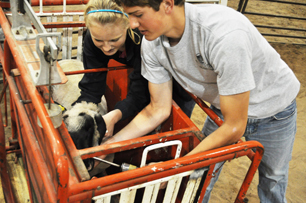G2158
Good Management Practices for Youth
Frequent Monitoring for Health Concerns
As a good and responsible livestock producer, you are providing excellent care for your animal on a full-time basis. Below are sound production practices to help your animal thrive in your care. In addition, a checklist has been provided to make sure you follow these guidelines prior to and while at fairs and other public exhibitions.
This is No. 3 in a series of seven documents on good management practices for youth. Copies of these documents, commonly asked questions, feed and water requirements, and many other animal care and well-being documents can be accessed at http://4h.unl.edu/resourceanimalcare.
Lindsay M. Chichester, Extension Educator
Dennis E. Bauer, Extension Educator
Dee Griffin, Extension Feedlot Veterinarian
Richard F. Randle, Beef Cow/Calf Production Specialist
|
Prior to Fair
Optimal health of your animals is best accomplished through continuous monitoring. You are the animal’s caretaker, and it is your responsibility to notice when an animal’s behavior is not quite right. Signs of possible pain and sickness may include, but are not limited to, vocalization, abnormal standing posture, reluctance to move, decreased appetite, restlessness, limping, nasal discharge, fever, or signs of depression. Even when you provide the best possible care for your animal, it may get sick. If you suspect your animal is ill, you should immediately contact your parent/guardian, leader, or veterinarian for a rapid diagnosis.
It is important to maintain a good relationship with your veterinarian, who can help you develop a proper health plan. Your vet can provide advice on good health practices that should be in place; assist with animal health diagnosis; and provide assistance with parasite control, vaccination, medication, and treatment plans. A well-protected animal is less likely to get sick if exposed to illness while at fair.
Some fairs and other public exhibitions require that your animal have a health certificate. This certificate, which must be provided by your veterinarian, indicates that your animal has tested negative for certain diseases (species specific). Plan ahead to ensure these tests are completed in a timely manner prior to fair. A delay in test results could result in disqualification.
Keeping accurate records and documentation of all animal health treatments is necessary to be a good youth producer. Accurate records will not only help your veterinarian if your animal requires examination, but you can also ensure that you have met all required withdrawal times, if applicable. Be sure to take these records with you to fair in case your animal becomes ill. Complete and accurate records could aid the fair vet in making a quick diagnosis for your animal (Table I).
| Table I. Accurate records to take to the fair. | |||||||
| Date of treatment | Animal name or ID | Name of medication | Type of treatment | Location of injection | Quantity of treatment | Withdrawal date | Comments/Observations |
|
|||||||
|
|||||||
|
|||||||
|
|||||||
Records should include:
- date of treatment,
- identification of the animal treated,
- name of medication given,
- type of treatment (injection, bolus, pour-on, etc.),
- location of injection (e.g., the neck),
- amount of medication (2 cc, 5 cc, 10 cc, etc.),
- withdrawal date, and
- comments or observations.
As a good youth producer, I know that prior to fair my animal has received:
- proper health protocol developed with my local veterinarian, including:
– current vaccinations (species specific),
– current on all parasite controls, - accurate documentation and records for all animal health treatments,
- negative test results (species specific) to accompany a health certificate,
- continuous monitoring to notice behavior changes, which may indicate possible health problems, and
- rapid diagnosis of health concerns for quick treatment.
While at Fair
If you have provided excellent care for your animal prior to fair and have worked on exposing it to situations similar to fair, your animal will be less stressed, and you both will be well prepared.
As a good youth producer, I know that at fair my animal has received:
- animal health treatments that have been properly recorded,
- continuous monitoring to notice behavior changes, which may indicate possible health problems, and
- rapid diagnosis of health concerns for quick treatment.
By following these guidelines prior to and during fairs and exhibitions, you can minimize stress for both you and your animal. In return, your animal not only will perform better but also will behave better. You will have the satisfaction of knowing that you have provided the best possible care for your animal.
Annually, Nebraska’s youth are required to complete Quality Assurance (QA) training. Quality Assurance is a program that educates youth about the best management practices for livestock production. In addition, it was developed to assure consumers that the food products produced from animals are wholesome and safe, and that the animals that produced the product were cared for properly. In 2012, this training also was made available online for 4-H and FFA members at three different age levels: Junior (8-10); Intermediate (11-14); and Senior (15-18). More information about the Nebraska Youth QA Program can be found at http://4h.unl.edu/qualityassurance.
This publication has been peer reviewed.
Visit the University of Nebraska–Lincoln Extension Publications website for more publications.
Index: Animals, General
Management
Issued June 2012
